2016 March Newsletter
|
|
Welcome to the 3rd edition of the 2016 Auckland Bridge Club Newsletter.
In this edition we bring you
- Club News
- Upcoming Club Events
- Upcoming Regional Events
- Building Update by Mark Roberston
- Interesting Hand by Sylvester Riddell
- Exposing the Psyche by Hamish Brown
- Club Member Achievements at Club, Regional, National and International level
- Wellington National Teams by Richard Solomon
Club News
Thank You do those who made donations to the club in addition to the annual club subs. receipts for donations over $50 are in named envelops to be collected at the office window sill.
If you need a receipt for your donation, please let Ann know.
Reminders and Notices
Please remember to display your Crimson Auckland Bridge Club Member Parking Permit when parked in our car park, so that your car is not towed while you are playing.
From the Committee
Vice President Mark Robertson updates us on the ongoing conversation about our club building, below.
New Health and Safety Rules come into effect as of the first of April. Immediate Past President, Anthony Hopkins will share the details in the April newsletter of how they will effect club members.
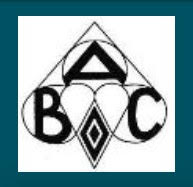

Easter 10A Teams
qualifying rounds March 27
Final March 28 and non-finalists are automatically entered in the Pairs event
Sponsored by
7 St Vincent
entries close 24/3/2016

Easter Monday Walk-In Pairs
Players entered in the Teams, who did not make the Finals are automatically entered in this event, at no extra charge
Sponsored by Remuera House of Travel
Sponsors
Our thanks to the sponsors for the Easter Congress. Please click on the logos to visit their websites for more information
Howick One Session 3B Junior Tournament
a single session to encourage new players to experience tournaments on April 2nd
Waitemata 8B Open Pairs
Saturday April 9th
Whangerai 5A Open Teams
Saturday April 16th
Mt Albert Intermediate 5B Junior 3B pairs
Saturday April 16th

Building
At the close of the AGM in November 2015, there was a short presentation from our Vice President, Mark Robertson, to discuss ‘securing the long term future of the club’. In that presentation, Mark talked about the work the committee had started, in thinking about the future options for our membership and our premises.
Mark discussed with members:
- the future vision the committee has for the club
- the challenges we face from falling attendances and membership (a problem shared with many similar organisations)
- that an unsolicited offer had been received from property developers
- some of the ways we might approach securing the long term future of the club.
Since the AGM, the committee have been having talks with several organisations and groups. We have also been very fortunate to have the support and advice of a professional property manager guiding us.
Mark said, “I’d like to thank everyone for the positive feedback we received following the November AGM. It’s worth mentioning that everything the committee is working on is the exploring of a wide range of ideas. We (the committee) are keen to narrow down our options and then come back to our members and get everyone’s feedback. We’ll call a meeting to do this sometime in May or June”.
Mark continues, “I know there are several members who hear about these discussions from some of the other parties we’re talking to. I find it a wee bit amusing that by the time the story has passed through several people, it can become somewhat exaggerated from the actual conversation we had”.
“But let me assure everyone, it is our members who will guide us on these options. Any important decisions will only happen with the endorsement of our members” said Mark, “creating long term value and securing our clubs and members future are the primary objectives of the current work”.
So keep an eye out for an information meeting in May or June. We’ll make sure we give everyone several weeks advance notice for that event.
Interclub 2016
Last Friday, March 18th, the first of the regions nine-session interclub series was hosted at Auckland Bridge Club.
Teams came from all over the Auckland Northland Bridge region, representing the following clubs: Auckland, Mt Albert, Howick, Franklin, Akarana, Royle Epsom, Waitemata, Waiheke, Papakura, Papatoetoe, E.C. Bays, Northshore and Franklin
There are a total of 47 teams in this years competition consisting of
9 Open teams, 3 from Auckland
18 Intermediate teams, 5 from Auckland
20 Junior teams, 3 from Auckland
Beginner Lessons Update
Russell Douglas
The Beginners' lessons have now begun on Monday evenings. We have had close to 40 attending each evening, and some very lively sessions.

Playing a big club system, you look forward to opening 1C when something unexpected happens: partner opens 1C in front of you. This is good news. Partner has at least 16 HCP which combined with your 18 HCP totals 34 - more than enough for slam. You won't be stopping below 6NT.
We play transfer responses to 1C, so I respond 1S which is game forcing with at least 5 clubs. Often transfer responses save us a level of bidding, but you don't expect that to happen on this hand because partner is bound to have the spade suit. Then another surprising thing happens - partner accepts your club suit by bidding 2C. In response to this we show controls (and Ace is counted as 2 controls, and a King is 1 control). With 2 Aces and 2 Kings, I have 6 controls, and the bid to show that is 3C. After partner digests this his next bid is rather disappointing - 6NT!. It feels like you have extra's and a grand slam could have been possible, but there is no room left to explore. You must trust partner and pass - he was in control of the auction and knows more about the hand than you do.
S: 53
H: KT653
D: 754
C: T87
S: K S: AQJ92
H: A74 H: QJ2
D: AJT9 D: K
C: KQJ43 C: A652
S: T8764
H: 98
D: Q8632
C: 9
There are a total of 12 controls in the deck. Our 6 added to partner's 5 makes eleven. Partner knows we are missing a King and makes the practical bid of 6NT. You can make 7C by ruffing a Diamond. Maybe if we embarked on a complicated series of asking bids we could have worked out that the missing King did not matter. Two pairs did bid 7C. However the brief auction resulted in a bonus - because Declarer did not show his Spade suit, the South hand thought it safe to discard a Spade, so we made an overtrick.
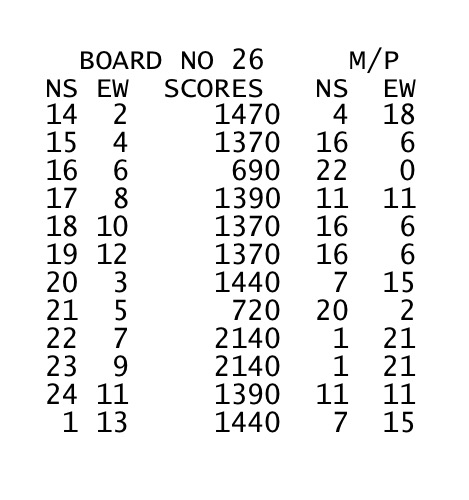
This is the travelling score sheet for the hand:
7C making 7 scored 21/22 Match Points or 95.4%.
6NT making 7 scored 18/22 or 81.8%.
This hand shows how important it is in Match Point scoring to be in the right denomination.
6C making 7 was worth only an average, being outscored by 6NT making 6, 6NT making 7, and of course 7C.
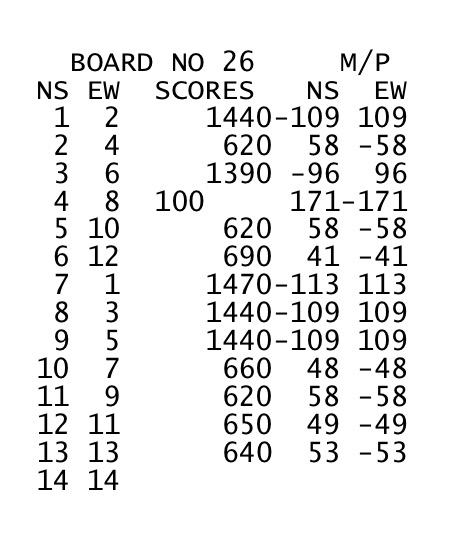
Editor’s Note.
This hand that Sylvester wrote up occurred in section one on a Tuesday night. As it happens, in section two they were playing the same boards using IMP scoring. The results there show that when using IMP scoring, in Swiss pairs, and in Teams, that there is a significant swing in points between those who bid and made slam and those who stopped at Game. No-one in this section bid the grand slam in 7C which would have created a further swing between those who bid the small, and the grand slams.
Exposing the Psych
Hamish Brown
Hamish Brown was South, Peer Bach North. Some players have a reputation for Psyching. On occasion they make a bid deliberately intended to confuse everyone and create mayhem. On this hand a well placed double exposed the psyche to East West early and a second double exposed the psyche to a sleeping South later in this auction. East West are vulnerable and North South non-vulnerable.

S W N E
2H / 2S* X*
/ /* 3C 3D
/ 3NT / 4S
X* / 5H X
/ / /
9
QJ83
653
QJ652
KQJT A76543
KT9 5
JT7 AQ942
T84 A
82
A7642
K8
K973
North’s holding here of long trump support few points and short spades are the ideal holding for his 2S psyche. He knows because South opened 2H that East West have a game in spades and his 2S deception is an attempt to stop them bidding what may be the only making game. This is a legitimate bridge tactic within the rules and although some players do not like getting deceived like this it can be useful to discuss counter measures with your regular partner.
South doesn’t know 2S is not natural although South should have noticed when East doubles and West passes, forcing North to run. On the actual hand South doubles 4S on what looks like 3 tricks across from Norths spade suit. Of course North did not have a Spade suit. Norths 5H response to Souths double alerts South to this rather late in the auction. Both East and West had worked out North’s hand early in the auction after Easts X 2S.
East West dealt with the psyche effectively. East’s X is an example of a double intended to expose the psyche. Generally X is take out and you should have length in the other two suits to X. When you expect a psyche and the opposition have shown two suits (here hearts and spades) you can double one of the suits expecting if you are right partner will pass for penalties and this catches North who has been exposed and must run. Now East West describe their hands to each other and settle on 4S as the best game. On this hand it assists East that they have a good hand with long diamonds so that they have another bid to make if needed.
The reason there must be two suits for this ‘double to expose the psych’ to work is that you must be able to cue to show various strong hands after a X. Here with two suits bid and spades a suspected psyche, East can cue hearts with a forcing hand if she doesn’t want to pass 2S for penalties.
On the following hand different tactics are needed:
If East opens 1S holding:
Q3
10954
J96
Q1074
What should South do, holding:
AJ10972
AKQ2
A7
2
It is expected by South that East has a minimum opening hand with spades, a takeout X shows short spades. It is critical that South not break partnership agreements by doubling. A useful agreement is that if you pass a suit and then double the same suit later in the auction it is for penalties, normally this happens when partner has shown some values.
On this hand if East has a normal minimum opening West and North have about 10 HCP between them and 1S may get passed out. If this happens and West has a 5 card heart suit then North South may miss a heart game – however 1S not doubled looks to be going very light and when North South don’t have a game on 1S not doubled will be OK. On a good day you may get to penalize 2S later in the auction after all. On the actual hand, West and North have 5 more spades between them and more points than might be expected.
It may assist you to redefine PSYCH in your mind as "Too high in the wrong Suit". The added advantage you have is that the opposition are outside their agreements and so the partner of the Psych-er may not realize they are too high in the wrong suit. If your side sticks to its agreements you are on firm ground and will sometimes be able to take advantage.
Achievements: Club Level
| Westchester Shield | Tuesday section 1 PM | Russell Watt/Leslie Watt |
| Swiss Pairs | Tuesday section 2 PM | Margaret Skegg/Susan Glennie |
| President's Pairs | Wednesday AM Sect. 1 | Wendy Walsh/Liz Ware |
| President's Pairs | Wednesday AM Sect. 2 | Linda Gray/Terry Melhuish |
| Summer Pairs | Monday AM | Brett Hart/Neville Thomas |
| President's Pairs | Wednesday PM | Ian Handricks/John Wilson |
| Summer Pairs | Friday AM Section 1 | Wendy Walsh/Shirley Pedersen |
| Summer Pairs | Friday AM Section 2 | Vera Woollerton/Sunday Millar |
| Summer Pairs | Friday PM | Amelia Herbert/Anisia Shami |
| Easter Pairs | Monday AM | Stephanie Benfell /Shirley Pedersen |
| Swiss Pairs | Tuesday section 1 | Sylvester Riddell/John Khourie |
| Presidents Pairs | Tuesday Section 2 | Liz Ware/Stephanie Benfell |
Achievements : Regional Level
Mt Albert's social bridge evenings started on Saturday February 27th, where Pat Milliner and Sandra Pearce's results caused a few goggling of eyes and jaws to drop, and earning them each a bottle of wine.
Carol Joseph and Anna Powell finished 3rd in the East Coast Bays Intermediate tournament on March 19th
Editor's Note: I have published those results that I either attended, or someone made me aware of. If you, or someone you know, participated in a regional tournament in the last 5 weeks and placed, and I have not mentioned it, please send me an e-mail with the details to include in next month's Newlsetter. Similarly, if you or someone you know participates in and places at a regional tournament in the next 5 weeks, please send me an e-mail with the details for including in the April Newsletter
Achievements: National Level
Every year, at year's end, the NZBridge website updates every member's point accumulation and uses this to assess that member's grade for the new year. They also assess the players who acquired the greatest number of Masterpoints in the year that has just concluded, one for the top scoring Gentleman, and one for the top-scoring Woman. This years winner of the Woman's trophy spent almost half the year overseas, which makes her achievement even more impressive.
Congratualtions Kathrin Boardman on winning the Baden Wilson Cup for 2015
Editor's Note: I have published those results that someone made me aware of. If you, or someone you know, has won a National award or participated in a National tournament in the last 5 weeks and placed, and I have not mentioned it, please send me an e-mail with the details to include in next month's Newlsetter. Similarly, if you or someone you know participates in and places at a national tournament in the next 5 weeks, please send me an e-mail with the details for including in the April Newsletter
Gold coast Congress 2016
Congratulations to
Sharon Stretton and Pauline Mulligan for winning the Intermediate Pairs D Final
Glenis Palmer and Christine Wilson for wining the Senior Pairs B Final
Tony Jiang and Julia Zhu for Winning the restricted pairs A Final and Denise Mayhew and Carol Joseph for winning the restricted Pairs E Final
Below: a couple of photos from the 2016 Gold Coast Congress
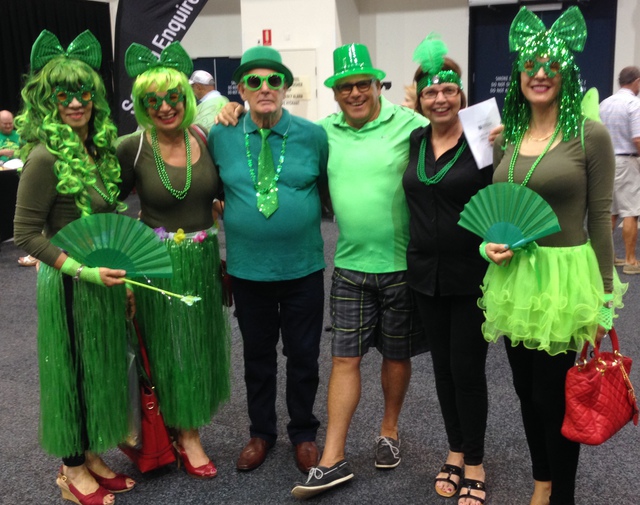
Photo Credit: Alice Young
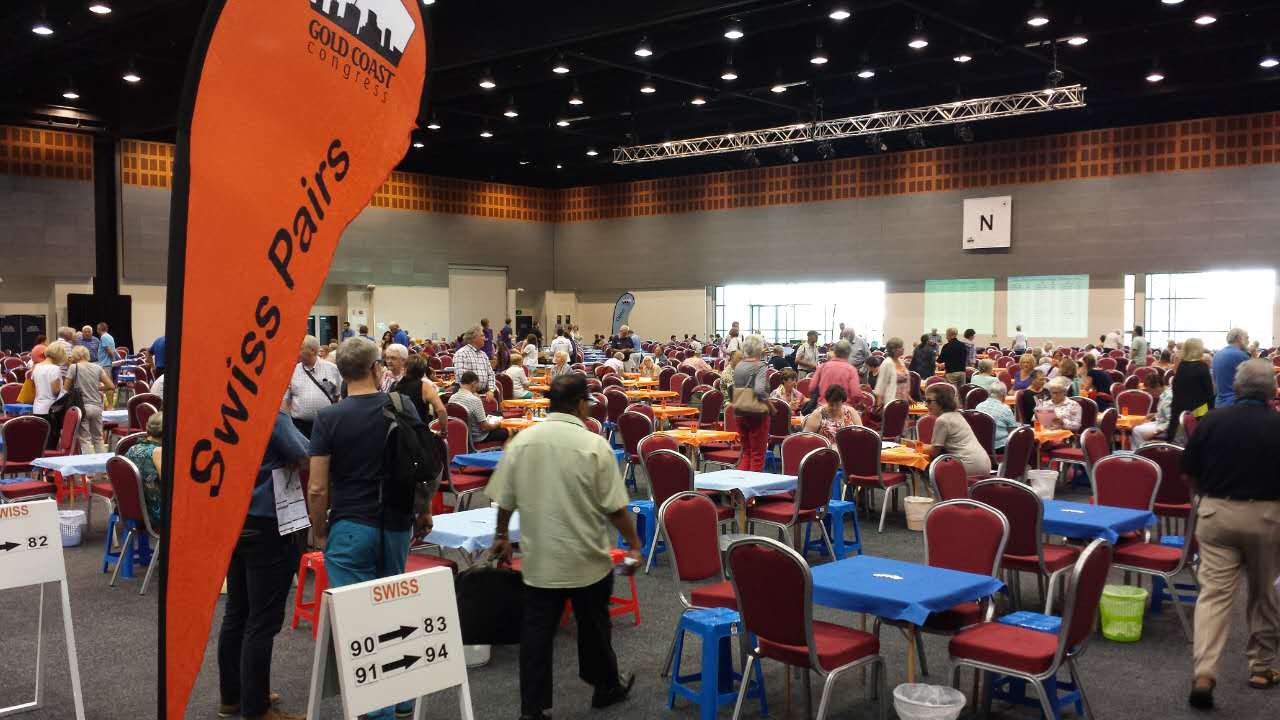
Photo Credit: Alice Young
A GREAT WELLINGTON WEEK-END;NORTH ISLAND TEAMS
Richard Solomon - re-printed with permission, originally published in NZBridge News
Wellington was the venue for the third qualifying event for the 2016 National Trials. Not that all 36 teams had a trip to Poland on their mind. The large field, following on 38 in Auckland and 28 in Dunedin, was proof that these events are popular and offer less ambitious players the opportunity to mix it with the best.
This time we had 9 round x 14 board Swiss format, a good number to determine a rightful winner. When the music stopped, trialists featured quite strongly at the business end, though the winning team contained a pair well qualified to be in our National team with another who made a strong statement for first time selection.
There were 126 deals of which we are only going to feature two. The first is a kind of deal which you will either love or hate, depending where the bidding ends.
At the 36 tables, there was naturally a wide range of contracts with North-South declaring 19 times and East-West 17. Game can be made both ways with 4![]() by East-West making very comfortably despite holding only 17 hcp combined. The bad trump break should and did in all bar one case beat North-South’s 4
by East-West making very comfortably despite holding only 17 hcp combined. The bad trump break should and did in all bar one case beat North-South’s 4![]() game. Even though a diamond lead will beat 3NT by South, all four times that was the contract, the spade lead from West plus the favourable club position gave South a very easy and successful ride.
game. Even though a diamond lead will beat 3NT by South, all four times that was the contract, the spade lead from West plus the favourable club position gave South a very easy and successful ride.
One rather successful option for East-West, this time, was for East to open the bidding 2![]() showing spades and a minor or spades and another suit. With such a "robust" spade suit, the bid is not for the faint-hearted. With South showing a strong balanced hand (2NT), West could go all the way to game and find the most perfect lay of the cards. There will probably be 2 trump losers to go with the
showing spades and a minor or spades and another suit. With such a "robust" spade suit, the bid is not for the faint-hearted. With South showing a strong balanced hand (2NT), West could go all the way to game and find the most perfect lay of the cards. There will probably be 2 trump losers to go with the ![]() A, but no more. Otherwise, East passes, North-South will find their heart fit and unless East does stick their toe in the water, their opposition will buy the contract in 3/4
A, but no more. Otherwise, East passes, North-South will find their heart fit and unless East does stick their toe in the water, their opposition will buy the contract in 3/4![]() .
.
The other deal came in the final match and was an opportunity for the North-South pairs to show their bidding skills.
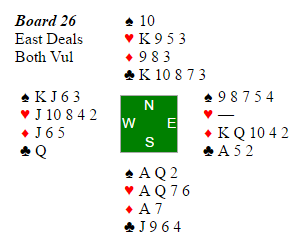
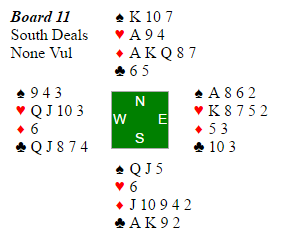
22 out of 36 pairs played the board in 3/4NT with only three being successful. Only four reached the cold 6![]() contract, including both pairs in the Coutts V Jacob match while 7 others can earn some form of honorary mention for reaching 5
contract, including both pairs in the Coutts V Jacob match while 7 others can earn some form of honorary mention for reaching 5![]() and staying clear of the no-trump trap.
and staying clear of the no-trump trap.
After a 1![]() opening from South, North has a very very awkward choice of bids unless one is playing Inverted Minor Raises, where 2
opening from South, North has a very very awkward choice of bids unless one is playing Inverted Minor Raises, where 2![]() shows 10+ points and is at least a one round force (some say it is game forcing). North just cannot bid 3NT at their first turn as they are too strong and have no heart hold. It is not usually wise to lie about one’s major holding though a made-up 2
shows 10+ points and is at least a one round force (some say it is game forcing). North just cannot bid 3NT at their first turn as they are too strong and have no heart hold. It is not usually wise to lie about one’s major holding though a made-up 2![]() call is not that appealing either. If you choose 2
call is not that appealing either. If you choose 2![]() , South raises the suit and you might be a little wary about no-trumps given partner is showing 9 cards in the minors.
, South raises the suit and you might be a little wary about no-trumps given partner is showing 9 cards in the minors.
An initial made up 1![]() response from North might work here if the bidding proceeds:
response from North might work here if the bidding proceeds:
North South
1![]()
1![]() 2
2![]()
2![]() 1 2NT
1 2NT
3![]() 2
2
1 4th suit forcing
2 slam try even if 4th suit was only a 1 round force (since any bid over 2NT should be game forcing)
Now, a 4![]() splinter (showing shortage) from South would be the winner.
splinter (showing shortage) from South would be the winner.
Let’s, though, see how Inverted Minor Raises can work. They worked very well for James and Sam Coutts and for Nick Jacob and Glenn Coutts:
North (Sam) South (James)
1![]()
2![]() (inverted GF) 3
(inverted GF) 3![]() (natural)
(natural)
3![]() (waiting) 3
(waiting) 3![]() (completes shape (usually 3154)
(completes shape (usually 3154)
4![]() (requests cues) 4
(requests cues) 4![]() 1
1
4![]() 1 5
1 5![]() 1
1
6![]() Pass
Pass
1 cue bids, first and second round shown together.
North (Nick) South (Glenn)
1![]()
2![]() (inverted GF) 3
(inverted GF) 3![]() (splinter)
(splinter)
4![]() (slam try, no
(slam try, no ![]() control) 5
control) 5![]()
6![]() Pass
Pass
Claiming for 12 tricks would have been so much more pleasant than receiving a heart lead in 3NT.
After 8 of the 9 rounds, Ware had a handy lead:
Ware 126.06
Coutts 109.61
Cornell 106.64
Hurley 103.21
Wilson 99.21
It looked like it was Ware’s event for the taking but a lot can happen in 14 boards..and did. Ware played Hurley and only scored 2.51 vps. Meanwhile, Coutts played Jacob (Tom Jacob-Brian Mace, Nick Jacob – Glenn Coutts) and scored 19.28. Suddenly, the maths looked very different and very good for Coutts:
- Coutts (James and Sam Coutts, Martin Reid- Peter Newell) 128.89
- Ware (Michael Ware- GeO Tislevoll, Alan Grant-Anthony Ker) 126.57
- Cornell (Michael Cornell – Ashley Bach, Michael Whibley- Matthew Brown) 122.67
- Hurley ( Evelyn and Bob Hurley, Wayne Burrows- Charles Ker) 120.70
- Humphries (Susan Humphries- Steph Jacob, Jenny Wilkinson- Shirley Newton) 110.94
- Wilson (Russell Wilson- Alister Stuck, Lorraine Stachurski- Mindy Wu) 107.63
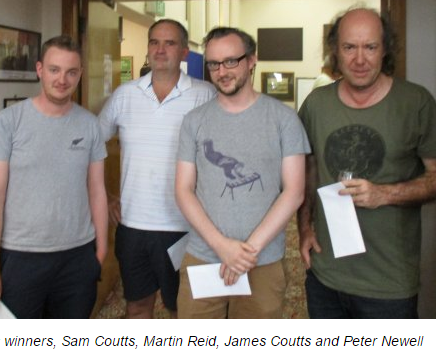
Apart from Newell-Reid, all the pairs in the teams who finished in the first three places and 5th place were “trials teams”. That was a great result especially for Sam and James Coutts which certainly helped in their being named reserve pair in this year’s Open team.
Finally, a special word of praise for all involved in the organisation where no stone was lefty unturned, including shuttling players to and from the airport, to the directors, Arie Geursen and Allan Joseph, the scorer, Sam Ward, a most efficient caddy in young player Tegan Bennick, all those behind the scenes and last and by no means least, Mindy Wu, who managed to be both caterer of excellent food and play in the team which finished 6th, a neat double.
Editor's Note: The NZBridge Newsletter can currently be found as a News Feed on the NZBridge website, which the above links to in the smaller heading of the article.
Newsletter Help
Thank you to those who took the time to let me know of our member's tournament results at club level, around the region, country, and at the Gold Coast Congress.
I look forward to getting more updates on results in the coming weeks to include in the 4th edition of the 2016 Auckland Bridge Club Newsletter.
Copy Deadline: Noon on Friday April 22nd

